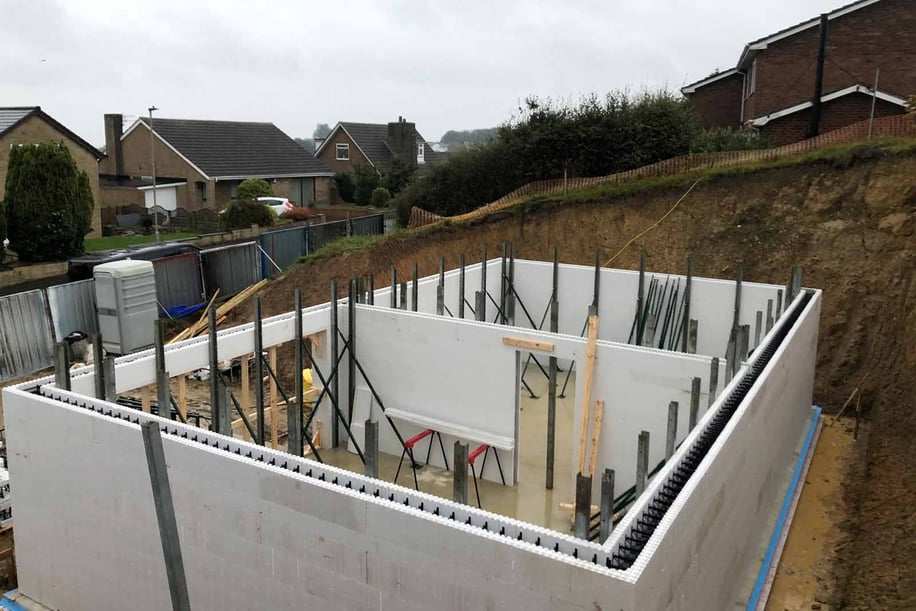At Allan Corfield Architects, we’re always exploring innovative materials that help deliver efficient, sustainable, and cost-effective homes. One material that continues to gain traction in both mainstream and specialist construction is Expanded Polystyrene (EPS). Widely known for its insulation properties, EPS is now being used in structural applications through block systems that offer surprising strength and versatility.
In this article, we explore how EPS blocks are used in modern construction, their technical performance, available densities, some of the leading manufacturers producing EPS-based systems, and the pros and cons of working with EPS.
WHAT IS EPS?
Expanded Polystyrene (EPS) is a lightweight, rigid foam made from polystyrene beads that are expanded and fused together using steam and pressure. Despite being 98% air, EPS boasts impressive compressive strength and thermal performance, making it ideal for insulation, void formers, and—more recently—formwork and structural block systems.
CONSTRUCTION APPLICATIONS OF EPS BLOCKS
EPS blocks are now used in a range of applications, especially in Insulated Concrete Formwork (ICF) and lightweight structural support systems. Some examples include:
- ICF Wall Systems – EPS blocks act as permanent formwork for reinforced concrete walls, providing insulation and airtightness.
- Floor Slab Insulation – EPS blocks are laid beneath concrete slabs to reduce thermal bridging and improve floor performance.
- Void Formers & Fill – Used in civil engineering to create embankments, reduce load on underlying soils, or form lightweight infill in bridges and roads.
- Foundation Formwork – Systems like JACKODUR® Atlas combine EPS with structural reinforcement to create insulated foundation slabs.
These solutions help reduce construction time, material waste, and long-term energy usage in buildings—aligning well with low-energy and Passive House construction.
EPS DENSITY AND BEARING CAPACITY
EPS blocks come in a wide range of densities, typically ranging from 10 kg/m³ to 50 kg/m³, depending on the application:
|
Density (kg/m³) |
Use Case |
Compressive Strength (kPa @ 10% strain) |
|
15–20 |
General insulation, ICF blocks |
~70–100 |
|
25–30 |
Load-bearing insulation, foundation slabs |
~150–200 |
|
40–50+ |
Structural void formers, heavy-duty areas |
250+ |
For example, EPS 300 (30 kg/m³) can bear loads of up to 300 kPa, making it suitable for load-bearing floor insulation and foundation formwork in residential builds.

PROS AND CONS OF EPS IN CONSTRUCTION
PROS
- Lightweight – Easy to transport and handle on site, reducing manual labour.
- Excellent Thermal Performance – Low lambda values ideal for low-energy and Passive House builds.
- Fast Installation – EPS block systems speed up construction through simplified formwork and insulation integration.
- Versatile – Can be used in walls, floors, roofs, foundations, and even civil engineering works.
- Moisture Resistant – Closed-cell structure limits water absorption.
- Stable and Durable – Long-term dimensional stability with little to no degradation.
- Cost-effective – Compared to traditional formwork and insulation separately.
CONS
- Combustibility – EPS is flammable and must be protected by finishes or fire-resistant layers to meet fire regulations.
- Environmental Impact – Made from petrochemicals; although recyclable, disposal must be carefully managed.
- UV Sensitivity – EPS degrades with prolonged exposure to sunlight unless protected.
- Limited Structural Role – On its own, EPS cannot bear major structural loads without reinforced concrete or other materials.
- Perception Issues – Some clients and builders may view EPS as less robust than traditional materials.
KEY EPS MANUFACTURERS
Several manufacturers have pioneered EPS block solutions with unique systems tailored for energy-efficient construction. Here are three industry leaders you should know about:
JACKON (NOW PART OF BEWI)
PRODUCTS: JACKODUR® Atlas, JACKON ICF Systems
HEADQUARTERS: Norway & Germany
Jackon is well known for high-performance EPS and XPS systems, particularly for their JACKODUR® Atlas foundation system—a fully insulated formwork system for concrete slabs. It provides thermal insulation and acts as shuttering in one, greatly speeding up construction time. Their ICF wall systems also provide excellent u-values and airtightness.
NOTABLE FEATURES:
- Lambda values as low as 0.031 W/mK
- Suitable for Passive House foundations

IZODOM 2000 POLSKA
PRODUCTS: ICF Wall and Slab Formwork Blocks
HEADQUARTERS: Poland
Izodom manufactures a range of ICF-style EPS blocks designed for ultra-low-energy homes. Their systems are modular and allow for fast erection of insulated, airtight concrete walls. They offer blocks with preformed reinforcement channels, corner blocks, and curved units.
NOTABLE FEATURES:
- Lambda values as low as 0.030 W/mK
- High fire resistance (up to EI 180)
- Suitable for basement walls, foundations, and external walls
- Widely used across Europe in Passive House projects
COMPACFOAM
PRODUCTS: Structural EPS for Load Transfer and Thermal Isolation
HEADQUARTERS: Austria
Compacfoam takes EPS to the next level with high-density load-bearing EPS elements. Their products are used as structural thermal breaks, reducing cold bridging in window installations, balconies, or under point loads.
NOTABLE PRODUCTS8:
- CF200 – CF600 range (up to 600 kg/m³)
- Compressive strengths up to 10 N/mm² (10,000 kPa)
- Precision CNC-cut for exact structural use
- Fully recyclable and moisture-resistant
Compacfoam is often used in Passive House window installations to support heavy glazing while maintaining thermal performance at junctions.
EPS blocks are no longer just about insulation—they’re shaping the future of energy-efficient construction. With systems that serve structural, insulating, and formwork functions all in one, EPS offers a lightweight, cost-effective solution for modern self-builders and developers alike.
At Allan Corfield Architects, we often specify EPS-based systems—especially for clients targeting Passive House standards or looking for smarter, more sustainable building methods. If you're interested in learning more about EPS or whether it's right for your project, don’t hesitate to get in touch.



